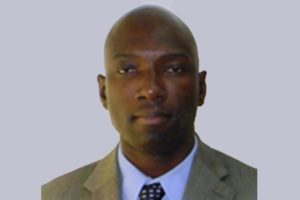
By Dr. Ousman Gajigo
The more we get to hear from Adama Barrow as for his justification for why he should stay for longer than 3 years, the more it becomes clear that he represents the brand of the political leadership that has taken this continent backwards instead of forward. The defining features of these politicians have been an almost complete disregard for truth, woeful ineptitude and widespread corruption.
A leader who will be able to lead a credible transition must be a leader with integrity, and Adama Barrow has demonstrated he lacks this quality. President Barrow went before the Gambian people as the flagbearer of the coalition, and promised that he would stay in power for only three years. Whether or not the memorandum of understanding among the political party was signed is not important. After all, we are not talking about a legal contract here. This is an issue of morals. A leader who rose to power by making a moral case against a dictator but is now reduced to making hair-splitting arguments about what constitutes a binding legal commitment is a leader with no moral compass.
This issue was highlighted in Barrow’s recent appearance in a BBC program. In that broadcast, he claimed that the 3-year plan was an oral argument rather than a signed commitment, implying that he is not bound by it. Let’s take a moment and digest that statement by the president. Adama Barrow is essentially telling us that a pronouncement by him that is not signed is worthless. If that is the case, can we really believe anything coming from his mouth? Does this mean that every pronouncement he makes that is not written and signed is worthless? When he was making the three-year promise, he knew no document was signed. He knew where the constitution stood, and was also aware that it can be amended. Promising one thing and knowingly go back on it has one clear label: lying. Adama Barrow lied to the Gambian people.
Barrow also told the BBC in that program that he has lots of work to do that cannot be completed in three years. This is the standard response by all power-hungry leaders who do not want to be bound by term limits. First of all, no individual or government has enough time. Time is the most binding constraint in the universe.
This also means that Adama Barrow is confused about the difference between the government and state. Whether this apparent confusion is willful or not does not matter. Governments come and go. The state, the Republic of The Gambia, stays. Various governments can have their policy objectives and have different degrees of implementation success, but the state remains. What’s more, there is a largely permanent core of civil service that remains in place as various governments get elected and get booted from office. If every government is to be left in power until they feel satisfied, then there would be only a few changes in government. This confusion between his government and the state is not some benign mistake. All autocracies start by leaders failing to make a distinction between their own person and the state.
There are several reasons why the Gambian people need to ensure that Adama Barrow keep his word and leave power in three years. For one, this government is scarily incompetent. Yahya Jammeh’s government, especially in the latter years was terrible, but appears to have higher competence than the current government. The degree of incompetence of Barrow’s regime is clearly visible to anyone by observing the appointment of key personnel in critical positions. Whatever limited progress we experience during Adama Barrow’s rule will occur in spite of, not because of his government.
The crucial issue of transition is now on-hold, as no credible transition can take place when you have a government that is unconcerned with reforms and correcting past wrongs, but one that is occupied by greed and the over-consuming desire to stay in power. Key members of the Jammeh government, including those that enabled him, helped him loot the country and helped him carry-out human rights abuses occupy key position in the Adama Barrow administration. Take a look at 2 cabinet positions: Minister of Finance (Mambury Njie) and the Minister of Foreign Affairs (Mamadou Tangara). Mambuary Njie’s role as a financial consigliere to Jammeh is well known. While busy serving Jammeh in innumerable ways, Tangara has reportedly sought the extradition of an exiled journalist. Only God knows what fate had awaited Ndey Tapha Sosseh if Tangara had succeeded in getting Mali to extradited her to Yahya Jammeh’s torture squad.
When we go beyond individuals, we can also see that apart from changing the debilitating system that Yahya Jammeh left us, the Barrow regime is actually strengthening some of them. Take the issue of the constitution. The existing constitution was created by Yahya Jammeh to cement his dictatorial rule. This constitution is full of all sorts of provisions that gave unparalleled power to the executive position (occupied by Jammeh) and instituted impunity by giving excessive powers to the state to curtailed the rights of citizens and provided immunity to Jammeh and his cronies. Everyone understands that it will take time to create a whole new constitution. While the CRC-led process is being done, there is however a wide scope for responsible actions by a true transitional regime. This will include, at a minimum, not taking advantage of provisions that were inserted in the constitution for the benefit of a dictator. It would also mean removing clauses that are simply incompatible with a constitutional democracy. Instead, the Barrow government has cynically been doing the opposite. In other words, rather than reforms being accelerated, the old system is being entrenched during the transition.
Let’s have a look at the administration. Here, I will just focus on the proliferation of ministries under Jammeh. Under President Jawara, The Gambia had a reasonable number of ministries. For the Barrow regime to reduce the number of ministries to a reasonable number that would have been easy, and would have greatly improved government efficiency. Instead, we have the ridiculous situation of having ministries that really should only exist as directorates within other ministries. This large number of ministries, which its concomitant duplication of positions, has contributed to the ballooning of government expenditures, which makes it difficult to correct the dire fiscal situation of the country. To compound this problem, the Tangara-led Ministry of Foreign Affairs is opening diplomatic missions as if The Gambia is an emirate drowning in oil money. In other words, another signature move of Jammeh is being cemented rather than being reformed.
Let’s move to another issue that badly needed reform of a sector during this transition. There has been no actual reform of the security sector, and no credible steps have been taken so far. The only things the government has been doing in this area is simply talking, holding worthless workshops and making bland pronouncements. The military leadership remains the same as it was under Jammeh. From the low rungs of the army to the leadership class, we still have soldiers who are completely confused about the proper role of the military in a democracy, as their testimonies in front of the TRRC continue to reveal. Instead of the military being reduced to a size appropriate for the country, the army is actually been encouraged to expand its activities beyond its constitutional mandate. The internal security situation remains unaddressed since the government is confused about the proper roles and duties of the various security branches. Notice that the police continue to be resource-starved while the military remains the same size as it was under Jammeh and continuing to command a greater share of the government budget.
Adama Barrow, like any other president, cannot be an expert in all areas. As such, the president needs to depend on qualified and competent individuals. But this means that the president needs to have the awareness and judgement to select those individuals who can effectively run the various units within the government, and dispense good advice. Unfortunately for The Gambia, this quality is what seems to be deficient in our current president. In addition to his personal inadequacies or because of them, the president has surrounded himself with an entourage of incompetent officials at the Office of the President, at various ministries and numerous other key government positions. The effect of this is evident in numerous current policies.
In addition to this major deficiency, the president has no regards for ethics that are needed to minimize corruption. Witness the frequent announcements that anonymous individuals are making financial donations to the Barrow Youth Movement (BYM) or to the president himself. There is nothing wrong with making a donation to a political cause backed by the president. But making a political donation in anticipation of a future benefit is corruption. What makes these anonymous donations problematic is that these individuals are certainly not anonymous to the president. Their gift-giving under complete anonymity means that there is no way for us to find out whether some contract or opportunity they receive from the government in the future is an illegitimate reward for their donations to a political cause. That the president is encouraging such actions shows that corruption will only grow in this government over time.
Barrow needs to respect his 3-year promise simply because we cannot afford more years under his government. The deterioration of standards in government is simply too much, and we may not be too far from a tipping point given that we are just coming from under 22 years of dictatorship. The lack of reforms, the president’s own lack of integrity and the level of corruption that is engulfing his regime would make the actual transition much longer and more painful for the country.
Ousman Gajigo is an economist. He has held positions with the African Development Bank, the UN, the World Bank and Columbia University. He holds a PhD in development economics. He is currently an international consultant and also runs a farm in The Gambia.


